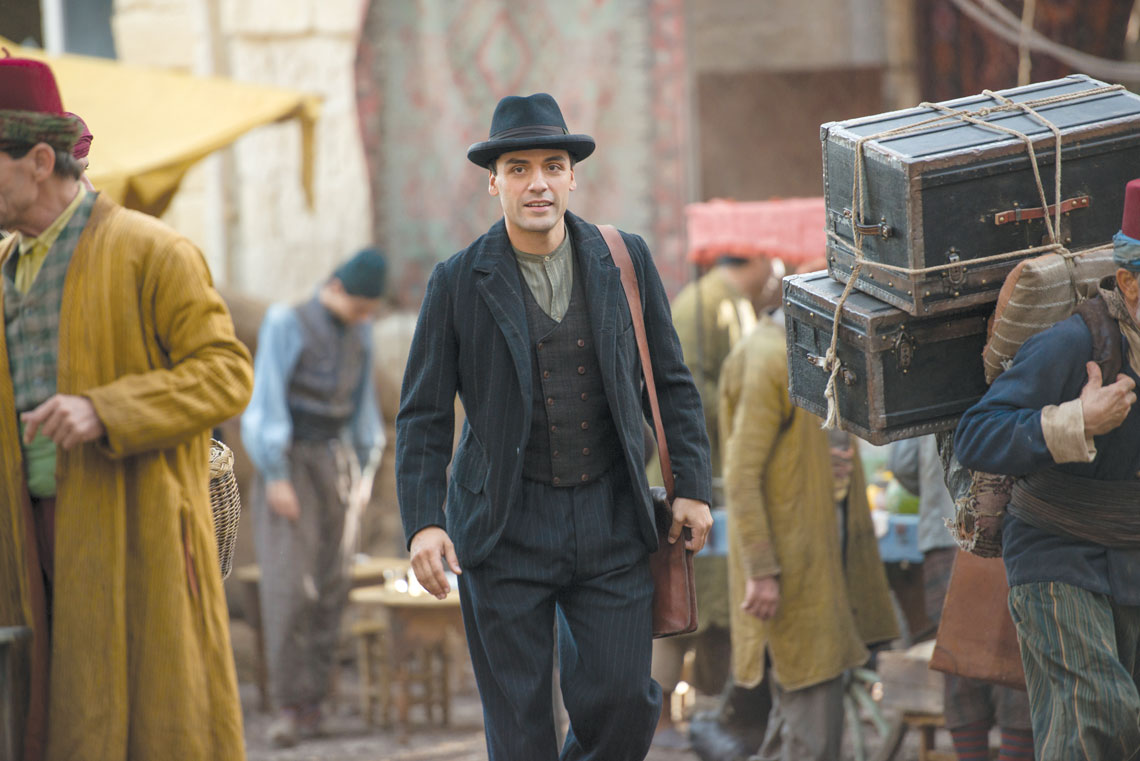 Oscar Isaac in “The Promise.” Photo by Jose Haro
Oscar Isaac in “The Promise.” Photo by Jose Haro If you go see the movie “The Promise” this weekend — and you should — you’ll notice a brief scene about two-thirds of the way through, one that ought to resonate even more deeply with American Jews.
“The Promise” is the first large-scale Hollywood film about the Armenian genocide of the early 20th century. It uses big stars, gripping action and a wrenching love story to tell about what the United Nations recognizes as the first modern, organized mass murder of a single people.
In the scene I’m referring to, Henry Morgenthau, the United States ambassador to the Ottoman Empire, played by actor James Cromwell, confronts Mehmet Talaat, the empire’s interior minister. Morgenthau demands the Turks put an end to the killing and forced deportation of innocent Armenians. When the official repeats the party line (which Turkish officials parrot to this day) that any deaths are the unfortunate consequence of the chaos of war, Morgenthau presents evidence compiled by American consuls and journalists of an organized and concerted effort to wipe out the Armenian minority. Talaat fixes Morgenthau with an icy stare.
“You are a Jew, Ambassador Morgenthau,” he says. “Why should you care about these people?”
Morgenthau answers that as a Jew and an American, he knows what it is to be persecuted, and a refugee.
That shuts upTalaat — but the killing continues.
I don’t know whether the incident happened exactly as it played on screen. But I do know that in reality, Morgenthau cabled Washington, D.C., to report, “a campaign of race extermination is in progress.” He exhausted himself trying to stop it and, despondent that he failed, spent much of the rest of his life raising the equivalent of $1 billion in today’s dollars for Armenian relief.
I used to think the Holocaust was special. I now know that it is, and it isn’t. It was preceded by genocides, it has been followed by genocides, and it will likely, tragically, be echoed by current and future genocides.
The current list includes those in Syria and Iraq, where, along with 500,000 casualties of the civil war, ISIS has singled out the Yazidi people for extermination. In the Central African Republic, continuing violence between Christian majority and Muslim minority militias have seen thousands murdered and hundreds of thousands driven from their homes.
In South Sudan, genocide already has taken 450,000 lives since 2003 and threatens to take many more. This year, the group Genocide Watch listed the failed state of Somalia at Stage 9 on the 10 Stages of Genocide and issued a Genocide and Mass Atrocities Alert. In Myanmar, the 1 million members of the Muslim minority Rohingya face persecution, deportation and starvation.
We know these things are happening. The lack of information is only a convenient excuse in hindsight. Even in Morgenthau’s time, there was contemporary reporting and eyewitnesses.
This week, we learned from newly released archives from the Wiener Library for the Study of the Holocaust & Genocide that as early as 1944, the West knew what was really happening in Auschwitz and Treblinka. Documents smuggled out to the Polish government in exile provided all the evidence leaders needed to act. Today, we have even fewer excuses.
The American-Jewish community focuses a lot of attention on what will happen when there are no more Holocaust survivors to bear witness to what happened. I can understand why. Each year I go to Holocaust commemorative events, where the survivors in the audience are asked to stand up. What used to be dozens of resolute individuals has now dwindled to a handful — and most of these men and women were young children during the war years.
Fortunately, we have created a firewall of memory that includes liturgy, museums, art, film and TV, books, academic research and documentary testimony that will speak to future generations. It is easy to groan at yet another Holocaust memorial or movie, but each is a testament to the disappearing survivors, that their suffering will not be forgotten, that the living have done their duty to the past.
The question we need to ask ourselves is this: Have we done our duty to the living? Are we listening to the eyewitnesses to the contemporary genocides who are trying to speak to us? Are we reading the unpleasant journalism from the Democratic Republic of Congo, South Sudan and Myanmar? As we turn our attention, activism and philanthropy, for good reason, to the shambles that is our domestic politics, are we ignoring the urgent pleas from this generation’s victims?
The answer is yes, we are guilty of all those things. The internet has made it easier than ever to find out what fresh hell is happening — just click on the website for Genocide Watch or add The Mantle (mantlethought.org) to your favorites bar. But the internet also has given us the attention spans of 2-year-olds.
Too sad? Too hard? Too much? Remember: We are the children of Morgenthau. If we, of all people, do not take up the cause of the victims of genocide, in every country, in every generation, who will?
Rob Eshman is publisher and editor-in-chief of TRIBE Media Corp./Jewish Journal. Email
him at robe@jewishjournal.com. You can follow him on Instagram and Twitter @foodaism
and @RobEshman.





















 More news and opinions than at a Shabbat dinner, right in your inbox.
More news and opinions than at a Shabbat dinner, right in your inbox.